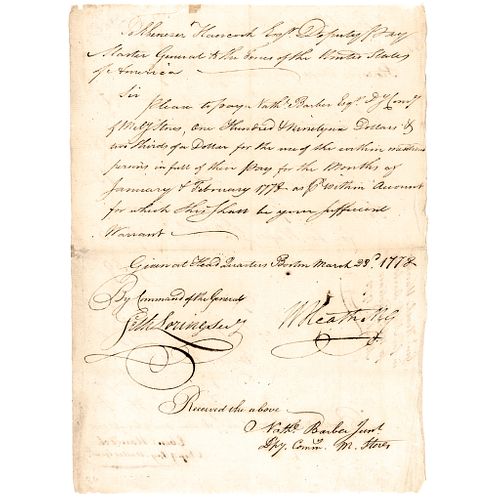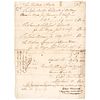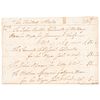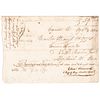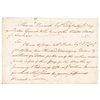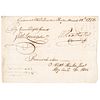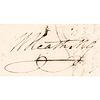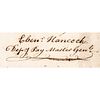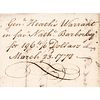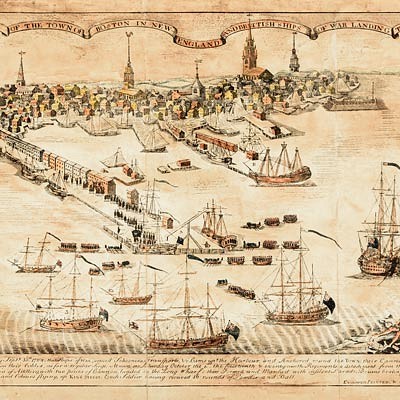Continental Army Major General WILLIAM HEATH Signed Revolutionary War Document
Lot 41
Categories
Estimate:
$2,400 - $2,800
Absentee vs Live bid
Two ways to bid:
- Leave a max absentee bid and the platform will bid on your behalf up to your maximum bid during the live auction.
- Bid live during the auction and your bids will be submitted real-time to the auctioneer.
Bid Increments
| Price | Bid Increment |
|---|---|
| $0 | $10 |
| $200 | $20 |
| $300 | $25 |
| $500 | $50 |
| $1,000 | $100 |
| $2,000 | $200 |
| $3,000 | $250 |
| $5,000 | $500 |
| $10,000 | $1,000 |
| $20,000 | $2,000 |
| $30,000 | $2,500 |
| $50,000 | $5,000 |
| $100,000 | $10,000 |
| $200,000 | $20,000 |
| $300,000 | $25,000 |
| $500,000 | $50,000 |
About Auction
By Early American History Auctions
Mar 20, 2021
Set Reminder
2021-03-20 12:00:00
2021-03-20 12:00:00
America/New_York
Bidsquare
Bidsquare : Autographs-Colonial-Political-Americana
https://www.bidsquare.com/auctions/early-american-history-auctions/autographs-colonial-political-americana-6509
330 Lots of Rare, Historic Autographs, Americana, Civil War Era, George Washington, Abraham Lincoln, Slavery & Black History, Revolutionary War Era, Colonial America, Federal Period, War of 1812, Colonial Currency, Indian Peace Medals & more... Early American History Auctions auctions@earlyamerican.com
330 Lots of Rare, Historic Autographs, Americana, Civil War Era, George Washington, Abraham Lincoln, Slavery & Black History, Revolutionary War Era, Colonial America, Federal Period, War of 1812, Colonial Currency, Indian Peace Medals & more... Early American History Auctions auctions@earlyamerican.com
- Lot Description
Autographs
Major General William Heath of the Continental Army Signed With Ebenezer Hancock (Brother of John Hancock)
Major General WILLIAM HEATH (1737-1814). Major General in the Continental Army during the American Revolutionary War, original member of the Massachusetts Society of the Cincinnati.
EBENEZER HANCOCK (1741-1819). Brother of John Hancock, Signer of the "Declaration of Independence", the 4th and 13th President of the Continental Congress.
March 23, 1778-Dated Revolutionary War, Autograph Document Signed, "W. Heath MG" (Major General), 2 pages, measures 8.25" x 11.5", at Boston, Choice Very Fine. Boldly written in rich brown and easily readable on very clean period laid paper. This Document is written to Thomas Hancock, Deputy Paymaster General of the Forces of the United States of America. It is ordering him to pay Nathaniel Barber, Deputy Commissary of Military Stores, the sum of $196 for four Continental Army soldiers' wages. The account for these soldiers is fully stated on the verso, having Signed Endorsements by Nathaniel Barber and Ebenezer Hancock, Deputy Paymaster General. Minor stamp hinge reinforcement of an edge tear at top, Docket written on the reverse side. This good content American Revolutionary War financial document is nice for display and is rare, having the dual signature combination inclusive of Ebenezer Hancock (1741-1819) Brother of John Hancock (Signer of the Declaration of Independence and the 4th and 13th President of the Continental Congress). Ebenezer also was the keeper of the Powder-house, Paymaster General of Continental Army, a Fire Warden, Selectman, and the official Inspector of the Massachusetts Mint.
William Heath (March 7, 1737 - January 24, 1814) was an American farmer, soldier, and political leader from Massachusetts who served as a Major General in the Continental Army during the American Revolutionary War.
Heath made his home for his entire life at his family's farm in Roxbury, Massachusetts (present day Jamaica Plain, Massachusetts, part of the city of Boston). He was born on a farm that had been settled in 1636 by his ancestors. He became active in the militia, and was a captain of the Roxbury Company of the Suffolk County militia regiment in 1760. By 1770 he was the regiment's colonel and its commanding officer.
In 1765 he was elected as a member of the Ancient and Honorable Artillery Company of Massachusetts and was elected as the Company's lieutenant in 1768 and as its captain in 1770.
In December 1774 the revolutionary government in Massachusetts commissioned him as a brigadier general. He commanded Massachusetts forces during the last stage of the Battle of Lexington and Concord in April 1775. As the siege of Boston began, Heath devoted himself to training the militia involved in the siege. In June of that year, Massachusetts named him a major general in the state troops, and the Continental Congress commissioned him a brigadier general in the newly formed Continental Army.
In 1776 Heath participated in the defense of New York City, and was one of those who urged General Washington not to abandon the city. He saw action at Long Island, Harlem Heights, and White Plains. In August 1776 he was promoted to major general in the Continental Army, but Washington had doubts about Heath's abilities and posted him where no action was expected. In November he was placed in command of forces in the Hudson River Highlands. In January 1777, Washington instructed Heath to attack Fort Independence in New York in support of Washington's actions at Trenton and Princeton, but Heath's attack was botched and his troops were routed. He was censured by Washington and thereafter was never given command of troops in combat.
General Heath was placed in charge of the Convention Army of John Burgoyne's surrendered troops after the Battle of Saratoga. In 1780 he returned to command the Highland Department after Benedict Arnold's treason.
Heath was listed as an original member of the Massachusetts Society of the Cincinnati.
After the Revolutionary War, General Heath was a member of the Massachusetts Convention that ratified the United States Constitution in 1788. He served in the state Senate 1791-1792, and as a probate court judge. In 1806 he was elected the Lieutenant Governor of Massachusetts, but declined the office.
He died at home in Roxbury on January 24, 1814, and was buried nearby in Forest Hills Cemetery The town of Heath, Massachusetts, is named in his honor.
Ebenezer Hancock (1741-1819), was the Brother of John Hancock, Signer of the "Declaration of Independence" and the 4th and 13th President of the Continental Congress. Ebenezer also was the keeper of the Powder house, Paymaster General of Continental Army, a Fire Warden, Selectman, and the Inspector of the Massachusetts Mint.
Our Auction Contents:
Black History & Slavery: (Lots 1 - 63)
Abraham Lincoln Related: (Lots 64 - 74)
Historic Autographs: (Lots 75 - 235)
Colonial America: (Lots 236 - 261)
Revolutionary War: (Lots 262 - 304)
George Washington Related: (Lots 305 - 306)
Early American Guns & Weapons: (Lots 307 - 318) - Shipping Info
-
Early American provides in-house worldwide shipping. Please contact us directly if you have questions about your specific shipping requirements.
-
- Buyer's Premium



 EUR
EUR CAD
CAD AUD
AUD GBP
GBP MXN
MXN HKD
HKD CNY
CNY MYR
MYR SEK
SEK SGD
SGD CHF
CHF THB
THB